
Motorcycle Week at Weirs Beach in Laconia. Courtesy photo.
Laconia, the “City on the Lakes,” is working to move past its seasonal reputation to become a year-round destination not just for visitors, but for businesses and young families.
Armed with a new master plan, bolstered by multiple development opportunities and the natural beauty of three lakes within its borders, Laconia is “on an upswing,” says Scott Myers, city manager.
Several major projects are in the works, including the $15-million restoration of the historic, long-vacant Colonial Theater downtown and a state-appointed commission looking into rehabilitating the sprawling former Laconia State School property just north of town.
The NH rock band Recycled Percussion, which gained national notoriety on America’s Got Talent, had a popular Las Vegas show and whose Emmy-nominated TV show “Chaos and Kindness” airs on WMUR, recently premiered a new storefront on Union Avenue in Laconia—the first of what it expects will be multiple Chaos and Kindness stores in the country.
Such developments come on top of continuing improvements to the city’s infrastructure, with $10 million invested in roadwork alone over the past three years, says Myers.
Taking on Challenges
All these projects are meant to address some of Laconia’s many economic challenges, ranging from an aging population to a lack of middle-income housing to pockets of poverty some might find surprising in a city known for pricey retirement homes and showcase lakefront estates.
Laconia’s “vacation destination” image has contributed to some of those challenges, as one in four homes in the city is occupied only seasonally, according to the master plan, adopted in May 2018.
While U.S. Census Bureau data shows an increase of 1,316 residential units in Laconia between 2000 and 2010, most were seasonal or retirement homes, the master plan states, with little construction of mid-range-priced homes needed to attract young families or working-age buyers.
Mayor Edward Engler says retirees bring significant disposable income to the city, but, “the problem is, we just don’t have that balance... We’re too old and too poor.
“I refer to it as wealth-preservation versus wealth generation,” he adds. “You have too many people in the wealth preservation state of their lives as opposed to the wealth generation and those two groups want two different things.
“[Retirees] made their money in the hustle and bustle of big cities and they come up here and now they want to live in a postcard,” he says. “That’s great for them but it’s not great for the people living in poverty. Those postcards hide a hell of a lot of poverty.”
The town’s seasonal popularity also affects employment, as many businesses that cater to tourists close during the winter.
“It’s kind of a scramble for restaurants, [and other businesses] to keep their employees,” says Dean Trefethen, the city planning director. “I don’t see any immediate solution to that other than to try to drive a younger, family-oriented part of the population to be here on a year-round basis.”
Creating balance—in housing, population and commerce—is the impetus for many of the city’s recent or ongoing projects, many of which are mixed-use with housing meant to attract young workers.
Like many NH communities, Laconia is a former mill town whose history includes lumber, grist and textile operations, as well as the Laconia Car Company, which built rail, trolley and subway cars and was the city’s largest employer from roughly 1848 until its closing in the 1930s. With the arrival of the railroad in the 1840s, tourism also became an economic driver.
Also, like many communities in the state, the city went through a decline following the closing of the factories and again during the last recession of 2008. Many city buildings and housing stock are older and in need of repair.
Reclaiming a Downtown Theater
The Colonial Theater restoration is seen as crucial to the revitalization effort.
“It’s a strategic investment in Laconia, especially the downtown,” says Justin Slattery, director of the Belknap Economic Development Council, which oversees the project. “It’s a great partnership between many partners, especially the Belknap Economic Development Council, the City of Laconia and [local developer] Rusty McLear.”
The three buildings that constituted the theater, last used in 2000, are being resurrected as a 750-seat auditorium; 10 upper floor residential units to be built by McLear; and commercial space.
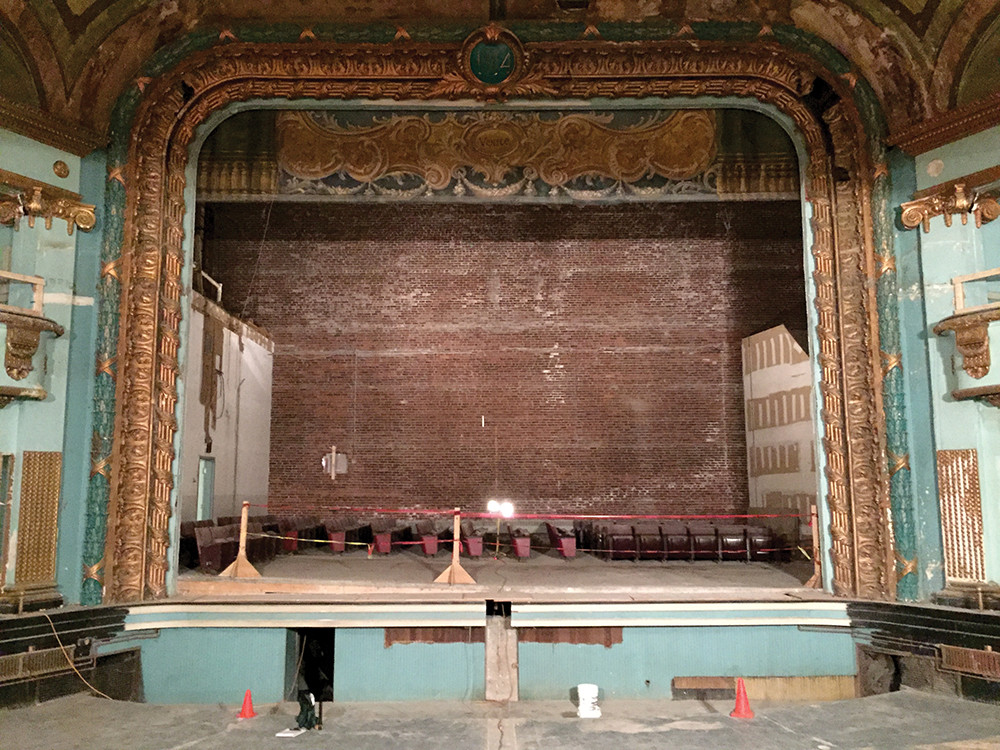
The Colonial Theater, vacant since 2000, is undergoing renovations. Courtesy of Belknap EDC.
Slattery says the city used multiple state funding sources, including LCHIP (Land and Community Heritage Investment Program), NH Community Development Finance Authority and Brownfields support, to launch the project. A capital campaign raised $1.5 million in private business and family donations for the project.
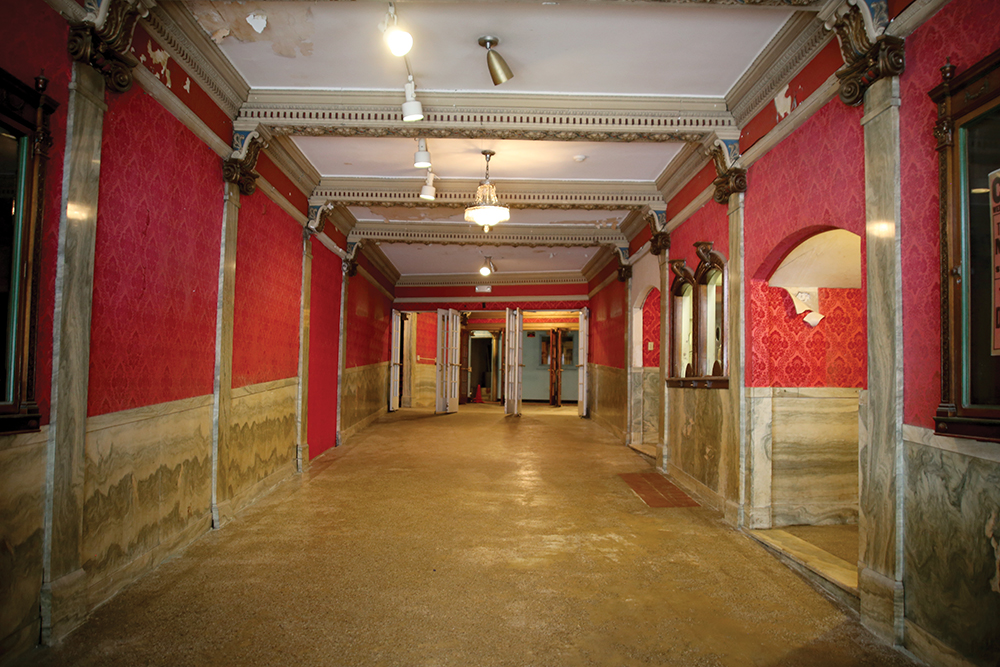
The Colonial Theater, vacant since 2000, is undergoing renovations. Courtesy of Belknap EDC.
The city’s total investment in the private-public endeavor is $8.1 million, according to Myers. “The really significant part of this is [the] city council having the courage and conviction to invest in the city with public dollars,” says Engler.
Construction is set to begin this fall, says Slattery, and will continue for about a year.
New Life for State School
Another major development project involves the 247 acres and roughly 46 buildings on the site of what was once called the NH School for Feeble-Minded Children when it opened in 1901.
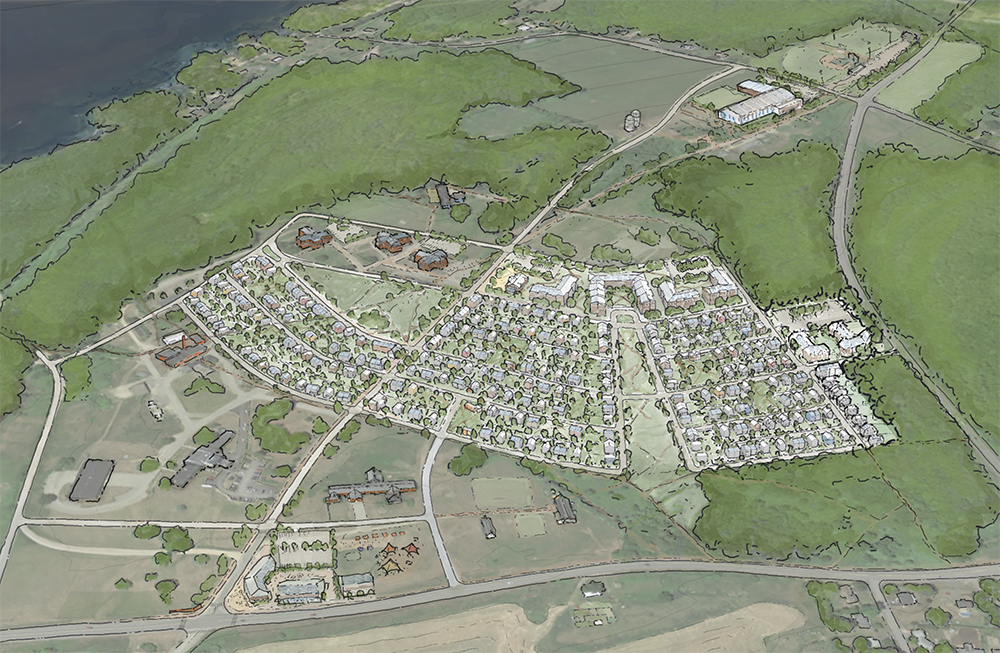
A rendering of the proposed development on the land of the former Laconia State School. Courtesy of George Bald.
Set on a rise between Lake Winnisquam and Opechee Bay and later known as the Laconia State School, the facility closed in 1991, leaving its historic buildings vacant.
Two years ago, the governor, speaker of the NH House and Senate president appointed a Lakeshore Redevelopment Planning Commission to study potential uses of the property, headed by George Bald, former commissioner of the state’s Resources and Economic Development Department. The commission recently completed a master plan for the property, which proposes a mixed-use development with an agricultural component, a health-care facility, a mix of market-rate and entry-level apartment and housing units, a hotel, and space for recreational activities.

A vacant building on the property of the former Laconia State School. Courtesy of George Bald.
“We see this as a really great partnership with the City of Laconia and something that will make a great difference for Laconia and the area,” Bald says.
About $300,000 has been spent on planning to date, he adds, with about $200,000 coming from federal matching funds. The commission has requested $350,000 annually for two more years to continue the work.
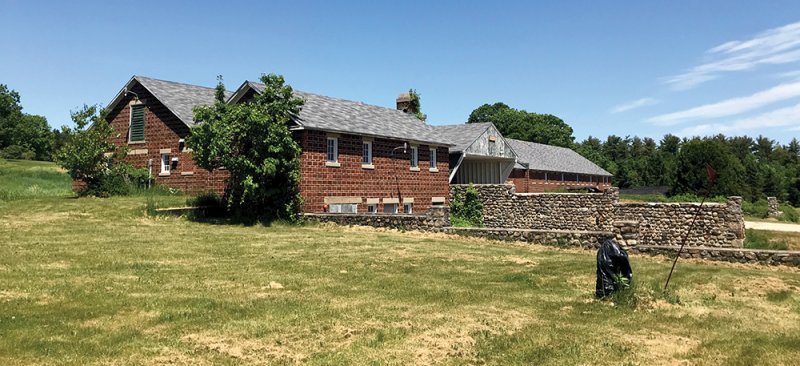
A vacant building on the property of the former Laconia State School. Courtesy of George Bald.
“We’re hoping it will be a public-private partnership so we’re not going to be expecting large sums of money from the state,” he says of the proposed development.
But Bald urges patience, noting that environmental tests need to be done so any interested private-sector developers can be assured the property is clean. Buildings also need to be assessed as to whether they are salvageable and new sewer and water lines need to be installed. Start of construction is at least a year away, he estimates.
Ongoing Development
Meanwhile, interest in other new projects continue. Planning Director Trefethen notes that local developer Scott Everett has purchased a number of properties in the Lakeport section of the city and is considering a “substantial” development. Plans are in the preliminary stages.
Myers says this would add to other positive changes in Lakeport, such as the recent expansion of Irwin Marine and a new showroom for Lakeport Landing Marina.
Justin Spencer, founder of Recycled Percussion, says he specifically chose his native Laconia as the site of the first Chaos and Kindness store because, “We wanted to go places that nobody else seemingly would want to go.

Justin Spencer, founder of Recycled Percussion and owner of the new Chaos and Kindness store in Laconia. Courtesy photo.
“You can walk through Laconia and see all walks of life and I mean that respectfully,” he says. “It’s just a great ecosystem of people. It’s exactly what I want to be around. I grew up in a trailer park and these are my people.”
The store opened in September with a city-wide celebration and fireworks. It has two sides: a “kindness” side with items to inspire people to make cards or pack food for people in need, and a “chaos” side, where visitors can do things like smash glass.
It’s all a reflection of the rock group’s philosophy, which is to “go streaking down the road and be a rock star and do something out of one’s comfort zone, and at the same time show kindness to people who need it,” he says.
Spencer says he’d like to have three to five Chaos and Kindness stores operating by the end of 2020, with Claremont being the next possible site.
Infrastructure Investment
City officials have taken action to encourage more development, consolidating the multiple commercial zones in the downtown district into one district “so everybody has the same rules and regulations,” Trefethen explains.
Some density requirements for downtown buildings have been loosened and the city has also adopted “performance zoning,” which provides relief from traditional zoning regulations for projects that meet master plan goals, such as encouraging more housing in the $200,000 to $350,000 range.
Several city officials say they’re already seeing some of the recent infrastructure improvements paying off. Trefethen cites $1.6 million in recent work on Lakeside Avenue in Weirs Beach, which included moving utilities underground, constructing a new road and adding new street lights.
As a result, he says, “We have had some revitalization of two or three of the larger restaurants and entertainment facilities. A couple of restaurants are staying open year-round and that’s a good development.” The master plan cites other recent infrastructure improvements, including construction of a pocket park at Busy Corner, renovations and an addition to the Central Fire Station, expansion of the Laconia River Walk and installation of a roundabout on Route 3 in Weirs Beach.
Building on Tourism
The city also continues to invest in tourism, including improvements to the W.O.W. Trail (Winnipesaukee-Opechee-Winnisquam), that follows railroad tracks from Winnisquam Lake, skirts the downtown area and runs to Lakeport.
“The dream is to get this all the way to Meredith and connect to trails throughout the state,” says Engler. “Our goal is to get it at least to Weirs Beach, which is another four or five miles. It’s going to be costly and there’s considerable pushback from some gated communities along the path, but it would be a spectacular tourist attraction for the entire state and the region.”
Other attractions already pull in crowds, such as the annual nine-day Laconia Motorcycle Week, or “bike week,” which draws some 200,000 people to the region for one of the country’s largest rallies, says Myers.

Bikers drive past the entrance to Weirs Beach during Motorcycle Week. Courtesy photo.
“It’s very important to the economic engine because it occurs at a time of year when normally, we would not have a lot of tourists,” adds Trefethen. Bike week begins on the Saturday of the weekend before Father’s Day.
The annual Laconia World Championship Sled Dog Derby, NH Pumpkin Festival in the fall and a multicultural festival in September are among other draws.
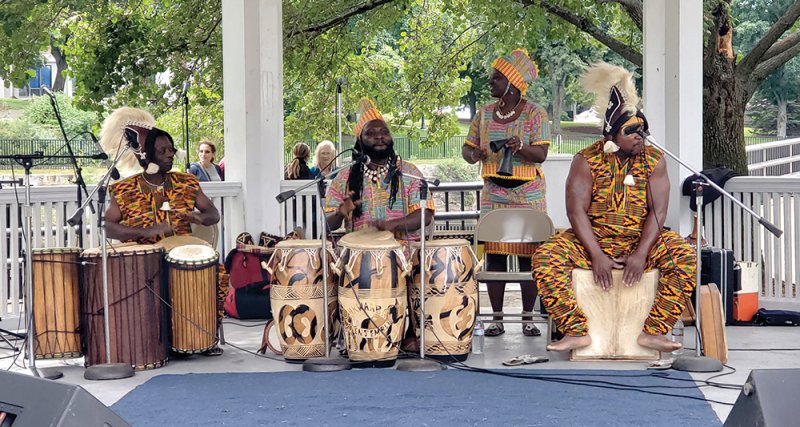
Akwaaba Ensemble African drummers at the Laconia Multicultural Festival. Courtesy photo.
An Eye to the Future
A continuing challenge for the city and for much of the state, is attracting workforce. City officials say they hope mid-range priced housing developments now on the drawing board will help address the shortage.
“This is a chicken or egg situation,” Engler says of housing and workforce needs. “The first thing people want is to get a company to build a new factory but we don’t have the workforce here. You have to get a labor force first to attract [businesses] here.”
Slattery at the Belknap Economic Development Council notes the Huot Technical Center and Lakes Region Community College offer numerous programs to encourage workforce development. “The community is committed to moving forward,” Slattery says. “When they see challenges, they find opportunity in those challenges.” Myers agrees. “We’re really in a beautiful location with a lot to offer,” he says. “Between our master plan and the Colonial Theater, public and private investment and improvements to our infrastructure, I see nothing but positive things ahead for Laconia.”
